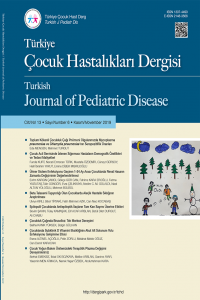Öz
Amaç: Çalışmamızda, tiroid disgenezisi ile ebeveyn yaşı arasındaki ilişkiyi değerlendirmeyi amaçladık.
Gereç ve Yöntemler: Kliniğimizde yaşları 0-17.9 arasında değişen, tiroid disgenezisi tanısı ile takip edilen 105 hastanın
verileri incelendi. Hastaların ve ebeveynlerinin yaşı, cinsiyeti, anne-baba arasındaki akrabalık durumu, ailede doğumsal
hipotiroidi öyküsü, klinik ve laboratuvar bulguları kaydedildi. Hasta gruplarındaki doğum tarihleri dikkate alınarak ve doğum
tarihleri eşleştirilerek her bir hastaya altı sağlıklı çocuk olacak şekilde kontrol grubu oluşturuldu.
Bulgular: Çalışmaya 105 tiroid disgenezisi tanılı olgu (56 kız, %53.3) ve 630 kontrol dahil edildi. Elli olguda (%47.6)
hipoplazi, 26 olguda (%24.8) ektopi, 20 olguda (%19.0) aplazi, 9 olguda (%8.6) hemiagenezi saptandı. Tiroid disgenezili
olguların anne yaşları ortalaması 27.87 ± 5.36 yıldı, kontrol grubuna göre daha yüksek saptandı (p<0,05). Anne yaş
grupları yüzdeleri karşılaştırıldığında 28-31 yaş grubunda ve 32 ve üzeri yaş grubunda tiroid disgenezili bebek sahibi
olma riski yüksek saptandı (p<0.05).
Sonuç: Çalışmamız, tiroid disgenezisi tanılı olgularda anne yaşının sağlıklı kontrollere göre daha ileri olduğunu göstermiştir
Anahtar Kelimeler
Kaynakça
- 1. LaFranchi SH. Approach to the diagnosis and treatment of neonatal hypothyroidism. J Clin Endocrinol Metab 2011;96:2959-67.
- 2. Rastogi MV, LaFranchi SH. Congenital hypothyroidism. Orphanet J Rare Dis 2010;5:17.
- 3. Hashemipour M, Hovsepian S, Kelishadi R, Iranpour R, Hadian R, Haghighi S, et al. Permanent and transient congenital hypothyroidism in Isfahan-Iran. J Med Screen 2009;16:11-6.
- 4. Tuhan H, Abaci A, Cicek G, Anik A, Catli G, Demir K, et al. Levothyroxine replacement in primary congenital hypothyroidism: the higher the initial dose the higher the rate of overtreatment. J Pediatr Endocrinol Metab 2016;29:133-8.
- 5. Unuvar T, Demir K, Abaci A, Buyukgebiz A, Bober E. The role of initial clinical and laboratory findings in infants with hyperthyrotropinemia to predict transient or permanent hypothyroidism. J Clin Res Pediatr Endocrinol 2013;5:170-3.
- 6. Nair PS, Sobhakumar S, Kailas L. Diagnostic re-evaluation of children with congenital hypothyroidism. Indian Pediatr 2010;47:757-60.
- 7. Keshavarzian E, Valipoor AA, Maracy MR. The incidence of congenital hypothyroidism and its determinants from 2012 to 2014 in Shadegan, Iran: a case-control study. Epidemiol Health 2016;38:e2016021.
- 8. Khammarnia M, Siakhulak FR, Ansari H, Peyvand M. Risk factors associated with congenital hypothyroidism: a case-control study in southeast Iran. Electron Physician 2018;10:6286-91.
Öz
Objective: In this study, we aimed to evaluate the relationship between thyroid dysgenesis and parental age.
Material and Methods: A total of 105 patients with thyroid dysgenesis who were between 0-17.9 years of age
were studied. The age of the patients and their parents, gender, parental consanguinity, family history of congenital
hypothyroidism, clinical and laboratory findings were recorded. Control group consist of six healthy children for each
patient, considering their birth dates.
Results: A total of 105 patients (56 females, 53.3%) with thyroid dysgenesis and 630 controls were included in the
study. Hypoplasia was detected in 50 cases (46.6%), ectopia in 26 cases (24.8%), aplasia in 20 cases (19.0%) and
hemiagenesis in 9 cases (8.6%). The mean maternal age of the patients with thyroid dysgenesis was 27.87±5.36 years,
which is significantly higher than the control group (p<0.05). There was an increased risk of having a baby with thyroid
dysgenesis in the 28-31 years and > 32 years age groups (p<0.05).
Conclusion: Our study showed that maternal age was higher in the patients with thyroid dysgenesis than in the control
group.
Anahtar Kelimeler
Kaynakça
- 1. LaFranchi SH. Approach to the diagnosis and treatment of neonatal hypothyroidism. J Clin Endocrinol Metab 2011;96:2959-67.
- 2. Rastogi MV, LaFranchi SH. Congenital hypothyroidism. Orphanet J Rare Dis 2010;5:17.
- 3. Hashemipour M, Hovsepian S, Kelishadi R, Iranpour R, Hadian R, Haghighi S, et al. Permanent and transient congenital hypothyroidism in Isfahan-Iran. J Med Screen 2009;16:11-6.
- 4. Tuhan H, Abaci A, Cicek G, Anik A, Catli G, Demir K, et al. Levothyroxine replacement in primary congenital hypothyroidism: the higher the initial dose the higher the rate of overtreatment. J Pediatr Endocrinol Metab 2016;29:133-8.
- 5. Unuvar T, Demir K, Abaci A, Buyukgebiz A, Bober E. The role of initial clinical and laboratory findings in infants with hyperthyrotropinemia to predict transient or permanent hypothyroidism. J Clin Res Pediatr Endocrinol 2013;5:170-3.
- 6. Nair PS, Sobhakumar S, Kailas L. Diagnostic re-evaluation of children with congenital hypothyroidism. Indian Pediatr 2010;47:757-60.
- 7. Keshavarzian E, Valipoor AA, Maracy MR. The incidence of congenital hypothyroidism and its determinants from 2012 to 2014 in Shadegan, Iran: a case-control study. Epidemiol Health 2016;38:e2016021.
- 8. Khammarnia M, Siakhulak FR, Ansari H, Peyvand M. Risk factors associated with congenital hypothyroidism: a case-control study in southeast Iran. Electron Physician 2018;10:6286-91.
Ayrıntılar
| Birincil Dil | Türkçe |
|---|---|
| Konular | İç Hastalıkları |
| Bölüm | ORIGINAL ARTICLES |
| Yazarlar | |
| Yayımlanma Tarihi | 23 Aralık 2019 |
| Gönderilme Tarihi | 19 Ekim 2018 |
| Yayımlandığı Sayı | Yıl 2019 Cilt: 13 Sayı: 6 |


